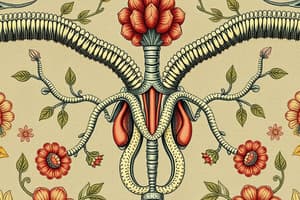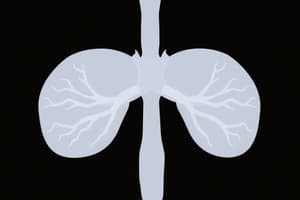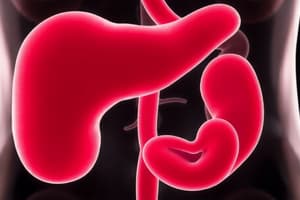Podcast
Questions and Answers
What are exocrine glands?
What are exocrine glands?
- Secrete their products into ducts (correct)
- Are ductless glands
- Secrete hormones into the blood
- Include sweat, oil, mucous, and digestive glands (correct)
What is an endocrine gland?
What is an endocrine gland?
A gland that secretes hormones into interstitial fluid and then the blood; a ductless gland.
Endocrine glands are vascular.
Endocrine glands are vascular.
True (A)
What are the endocrine glands of the human body?
What are the endocrine glands of the human body?
What organs contain cells that secrete hormones but are not exclusively endocrine glands?
What organs contain cells that secrete hormones but are not exclusively endocrine glands?
What is the basic difference between endocrine and exocrine glands?
What is the basic difference between endocrine and exocrine glands?
What are the functions of hormones?
What are the functions of hormones?
Flashcards are hidden until you start studying
Study Notes
Exocrine Glands
- Secrete products into ducts that transport secretions to body cavities, organ lumens, or the body's surface.
- Examples include sudoriferous (sweat), sebaceous (oil), mucous, and digestive glands.
Endocrine Glands
- Ductless glands that release hormones directly into interstitial fluid, which then enter the bloodstream.
- Vital for maintaining various physiological processes in the body.
Vascular Nature of Endocrine Glands
- Highly vascular due to a reliance on the cardiovascular system for hormone distribution.
- Among the most vascularized tissues in the body.
Major Endocrine Glands in Humans
- Key glands include:
- Pituitary
- Thyroid
- Parathyroid
- Adrenal
- Pineal
Additional Organs with Endocrine Functions
- Several organs contain hormone-secreting cells, including:
- Hypothalamus
- Thymus
- Pancreas
- Ovaries
- Testes
- Kidneys
- Stomach
- Liver
- Small intestine
- Skin
- Heart
- Adipose tissue
- Placenta
Basic Differences Between Gland Types
- Endocrine glands secrete hormones into interstitial fluid, which then diffuse into blood circulation.
- Exocrine glands utilize ducts to direct secretions into body cavities or onto surfaces.
Functions of Hormones
- Regulate:
- Chemical composition and volume of interstitial fluid
- Metabolism and energy balance
- Contraction of smooth and cardiac muscle fibers
- Glandular secretions
- Immune system activities
- Control growth and developmental processes.
- Manage the functioning of reproductive systems.
- Aid in establishing circadian rhythms.
Studying That Suits You
Use AI to generate personalized quizzes and flashcards to suit your learning preferences.




